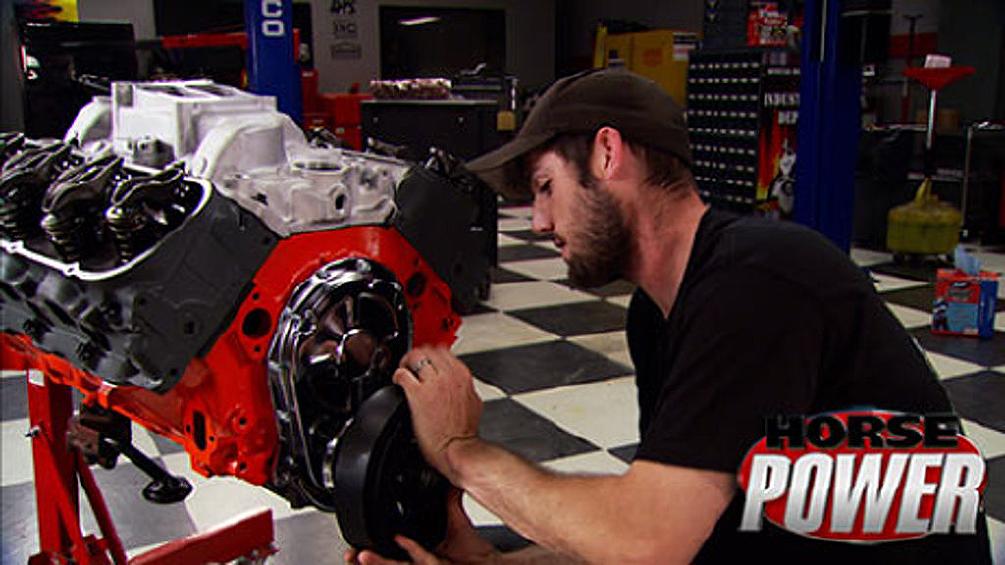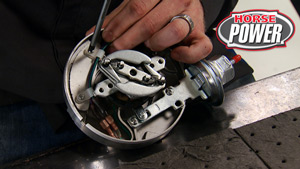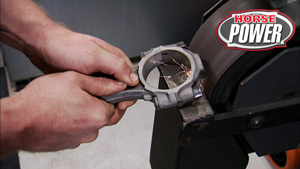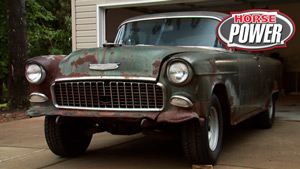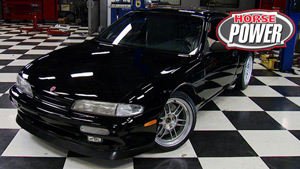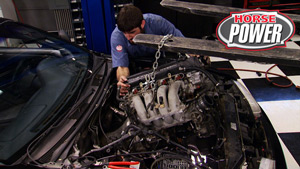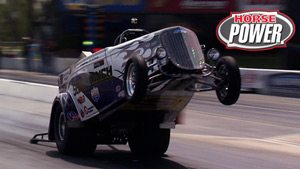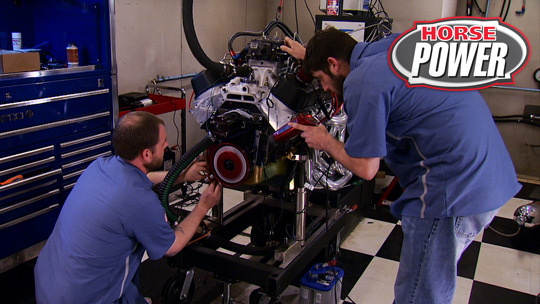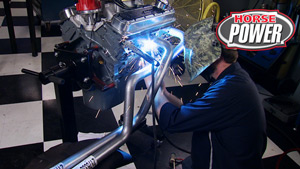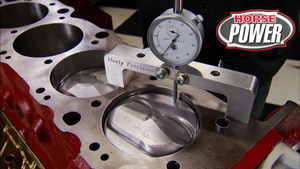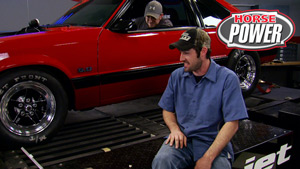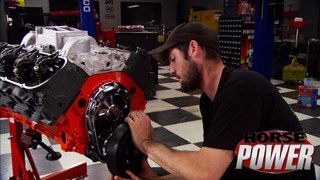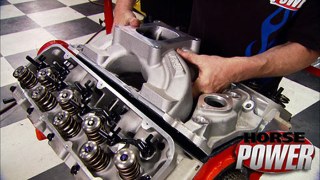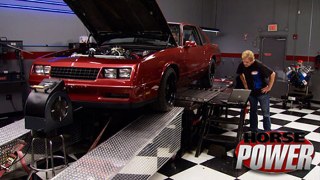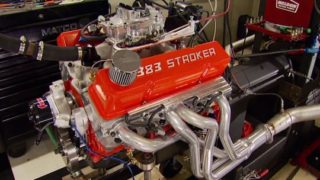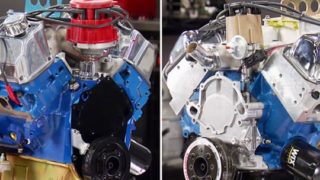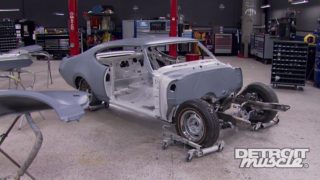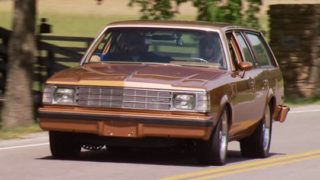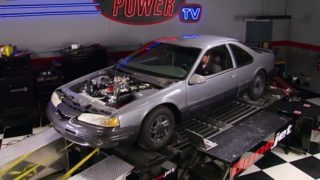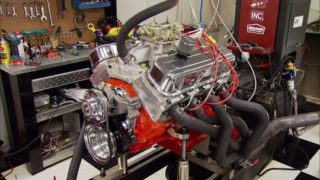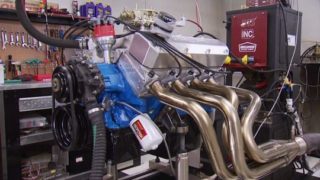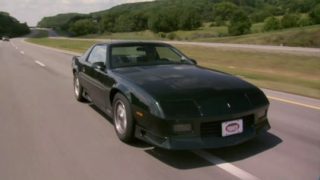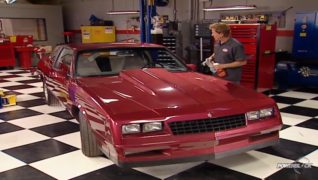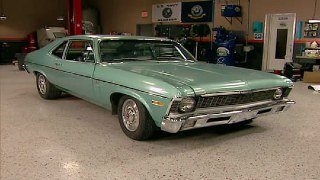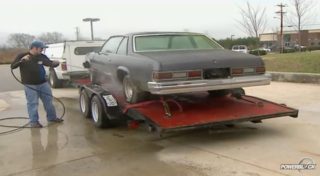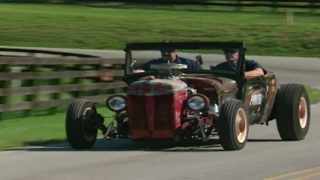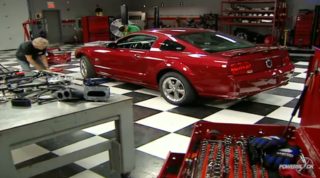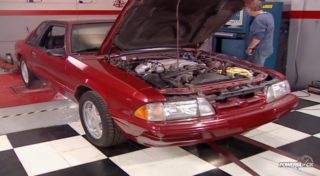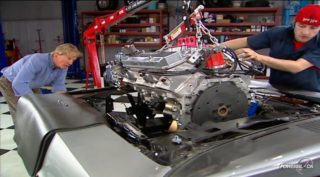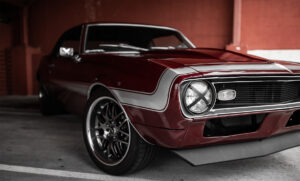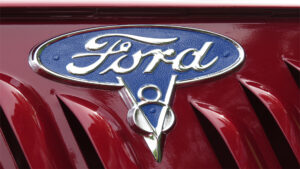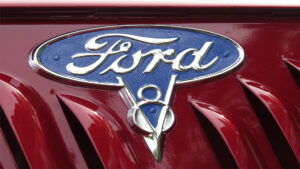More Chevy 454 Big Block Episodes
HorsePower Builds
Want more content like this?
Join the PowerNation Email NewsletterParts Used In This Episode
ARP
Cylinder Head Bolts, High Performance, Hex Head, Chevy, Big Block, Kit., moly assembly lube.
Mallory Performance
Distributor, Magnetic Pickup, Vacuum Advance, HEI, Chevy, Big/Small Block.
Summit Racing
Cam and Lifters, Hydraulic Flat Tappet, Advertised Duration 286/296, Lift .540/.540, Chevy, Big Block, Kit.
Summit Racing
Carburetor, Summit, 750 cfm, Square Bore, 4-Barrel, Manual Choke, Mechanical Secondary.
Summit Racing
Engine Dress-Up Kit, Steel, Chrome, Chevy, Big Block., Timing Cover Bolts, Billet Distributor Hold-down
Summit Racing
Summit Racing Street & Strip Stage 1 Intake Manifold, Chevy, Big Block, Oval Ports.
Summit Racing
Water Pump Pulley, V-Belt, 2-Groove, Steel, Chrome, Chevy, Big Block, Long Pump., Crankshaft Pulley, V-Belt, 3-Groove, 7.8 in., Steel, Chrome, Chevy, Big Block, Long Pump.
O'Reilly Auto Parts
Mechanical water pump cast iron
Pioneer Inc.
Stock harmonic balancer
Summit Racing
Spectre hpR high performance air filters
Episode Transcript
Good,
clear back there.
Yeah, we're doing fine. I'm good up here. Nice big engine bay.
Oh boy. Talk about a marriage made to horsepower. Heaven.
Chevy's last full size rear wheel drive muscle car and G MS first big block from a box. The 502 is only the second non production GEO performance fars motor. And well, 20 years later, it's still a big choice for guys who just wanna plug and play when it comes to motors. Not too long ago, we got the point.
You see after we gave our 85 Monte Carlo a nine inch rear end
upgrades for the suspension
brakes
and exhaust. Not to mention a trans conversion from factory automatic to five speed.
Hey, we were glad to forego the engine build this time and use the crate mode
and when it was time for the payoff, man, that 502 engine more than made the Mighty Carlo live up to its nickname.
And later on the
dyno Jet, it proud to produce 420 plus horsepower on the rollers, 515 ft pounds of torque.
So you're probably asking yourself why did those idiots pull that motor out anyways. Well, good question. See, some of our power block neighbors have been bugging us to let him use it for one of their project vehicles. Now, we hate to see grown men cry. So we're gonna let it go, but we are gonna build something different for it.
And in a way it's the Chevy version of a big block project that came out of the blue. A few months ago,
we challenged ourselves to build a Ford 460 on a poor man's budget of less than $2500.
Some parts were used. Some stock replacements.
All good enough to make a cheap blue oval bullet were 378 horsepower.
But hey, we didn't stop to pat ourselves on the back.
We launched a stage to build with a big cam performance heads, single plane intake and 1000 CFM card.
The payoff this time, 607 horsepower.
Well, this time it's Chevy's turning the spotlight
and for a foundation. How about this 454 short flo that we found had machine and rolled in here for two build ups first. Uh bang for the low buck build up and see how we compare with that Ford. Then we're gonna take the gloves off for a high performance build and see if we can beat or beat the 460 numbers
for the budget bill. We cleaned up these cast iron heads, then went into the
catalog for a bill sheet of affordable parts for like these pulleys
aluminum intake manifold, basic dress up kit
and hydraulic flat tap and lifter and cam set.
This thing is a replacement for 67 and up Chevy 396 to 4, 54 cubic inch engines
with an operating range of 25 to 5500 RPM.
Now duration of 50,000 is 228 and 238.
Well, next to go in are the hydraulic flat tap at lifters from our summit kit
with plenty of lube on the bottoms where they contact the
clos.
Then a stock replacement, double roller timing set.
But wait, we haven't talked about budget for the old motor. We sold out $250.
Then our machining bill came to 700
we spent 1350 on parts.
So we're at $2300 which is about 200 bucks under the Ford budget.
Yeah, refurbishing these old cast iron heads is one way we save so much money. Now,
these things are an open chamber design and well, that basically refers to the size and shape of the combustion chamber.
Closed chambers were kind of bath tub shape. These kidney shaped and they went to these in the late sixties for improved fuel economy with lower compression. As a trade off
in their 27 year run, 450 fours were rated as high as 460 horsepower in the early seventies. At as low as 230. Back in the mid eighties,
we're using a RP head bolts. And what we're doing is putting thread ceiling on the threads
and then some A RP assembly lube on the upper part of the threads. Now we're doing the ceiling because our water jackets are open and not blind,
the balancers next. And we got this one from pioneer for our big block Chevrolet.
But if you remember correctly, the Ford was a little different.
They used a two piece balance assembly on the front of the crank snout. The first piece to go on was a cast counterweight that got sandwiched in between the harmonic dampener. Now, Chevy did this. They use a counterweight that's installed in the center of the harmonic dampener to balance theirs. Needless to say it's the same results just a different path to get there.
Our water pump is a cast iron mechanical from o'reilly Auto parts.
Then a pair of chrome pulleys for the pump and the crank shaft.
Now we can cover our stock oil pump and pick up with a GM replacement pan to finish the bottom end
last but not least a Mr gasket oil filter adapter.
We'll finish the rest of it in the dining room.
Meanwhile, I can't help thinking how cool it's gonna be to get this burgundy beast back on the streets
and when it's eventually time to drop the motor in,
things are gonna fit like a burger in a bun, same headers, same leakage. We'll even use those motor mounts after the break. We'll have our burger on the grill and see how much sizzle we get on the dyno.
You like them pork rinds.
We're back and about to see which budget big block produces the most power. Months ago, we built a budget 460 Ford big block that made an impressive 378 horsepower on our
dyno.
today, we built up its Chevy counterpart 454 with a used short block. Some fairly basic budget parts including a hydraulic flat tab at CAM and valve train set up plus a dual plane aluminum intake manifold, all for around 2300 bucks.
We're getting really close to seeing how this bow tie motor stacks up to its Louisville counterpart.
Any predictions
and you always put me on the spot. You know, these things are built pretty identical. I'd be scared to say, but I will tell you this. I think they're gonna make within 20 horsepower of each other. I bet the Chevy guys are hoping that.
Well, they've got a shot with this mallory he I distributor that has a billet housing. Plus we're using a set of their pro sidewinder eight millimeter wires
to keep the playing field level. We're using the same 750 CFM Summit car we used on the Ford build,
I
burn it up.
All right, Joe, you wanna give it uh fire it up.
Now, since it's loaded with a hydraulic flat Sabin valve train break in oil and some run time, it's mandatory to avoid scarring the camp shaft
current,
low pressure
and that's all we need.
So, Chevy might have something for that. Ford.
Here's a little horsepower history on the 454 in its pre 1973 glory days, the LS Six version was factory
dyno at 450 horsepower.
The Ford 460 stock advertised horsepower was 365.
After five gallons of gas, we dump the break in oil
and fix this small but annoying leak.
Let the battle of blue and orange begin.
That will make the Chevy guys happy or not. I hope so. Let's see.
I like when everybody's happy.
3 84
384 horsepower, 524 pounds of torque. Surprise aren't you? That's only the four grand Joe.
I know let's make a 4504
0407.
I'm liking these numbers. I can't believe
this voter is ready for five grand and I bet you blue oval fans are ready to kick the TV.
Hey, car though, I'm partial to Ford myself, but
you gotta hand it to this 454 combination
standing
409, but it may have peaked out. Well, maybe not, but that's enough salt in the wounds for one day
after crunching the numbers. Here's how the two budget big blocks stacked up against each other. As you can see, Chevy runs away with it 31 more horsepower than the budget version of the 460
and ironically 31 more foot pounds of torque.
That's two motors with just about the same size block and similar parts packages. It's gonna make stage two's build up even more interesting. You see next week we throw away the budget, tear down that 454 and build it up with high performance parts. We'll see if it meets or beats the Ford's top number of 607 horsepower.
Hey, coming up a celebration of cool nostalgia racing and hot rod heroes don't miss it.
Hey, I wanna know what's best about the good old days. Well, if you come to Bowling Green, Kentucky once a year, you can see it, hear it even smell it.
It's Hot Rod reunion time and we're here for a blast back in the past.
This is where it's at. I mean, this is where you're racing.
He is supposed to be now,
he could be right. Fans of all ages eagerly invaded the midway
packed the wooden grandstands
and immersed themselves into the glory days of hot rod racing
at
this fundraiser for the N hr A museum.
Talk about living history. You get to see up close the famous cars from the past
and meet some of the people behind them whose winning weapons were skill and grassroots ingenuity.
You couldn't buy horsepower back then, I mean, you, if you wanted to have something new, you had to make it
or evolve it yourself.
The old time racers come to reminisce and mingle with the fans who watched their race into the history books.
Hey, without the fans, not too many people would have heard of sock and Martin
in the sixties and seventies, the Sox and Martin race team dominated the superstock eliminator class a few years before his death. I met Ronnie match racing. Bob Reed at this Mopar
Madness event in Saint Louis
and got to witness that legendary four speed power shifting prowess of his.
Of course, it was equally neat to meet his old teammate buddy Martin
here at one of their old stomping grounds, won a few races here up in.
Well, I don't, I'm trying to remember if we won or we lost it.
I, you know, usually wins. Stick in your mind. So maybe we didn't win,
forget about what people are saying about the economy right now. There's a record number of cars here for this year's showing shine.
In fact, there's so many nice cars here. It's gonna take something really oddball or just flat out over the top to get your attention.
As always a mixed bag of classic restored and modified machines line the rolling concourse,
but neither a slick street rod nor a caddy convertible could draw a crowd like this oddball entry.
Some things that people come up with one freaking Lincoln
and the owner showed both a sense of humor and imagination to create many of the parts from the super tall intake runners
on down to the square tube headers.
So, what's our over the top pick? Well, it's gotta be the sleek and low 69 Mustang Mach one built by its Georgia owner and his son.
It's section three inches chopped. Two inches
has uh uh
428 co bridge jet
tree. Me,
five speed
torso
bar, front end
mustang, 8.8 rear end,
whether you like or not, you're probably gonna look at it. So
like a drug, you know, you, you get addicted to it, you can't quit.
Well, over 400 addicted racers came to compete at this vintage track
and nothing gets the crowd going like a blister and run by a front engine top fueler like this one driven by Adam
Soin who's following in his father's footsteps,
the front engine car, you know, I, I wanted to drive a long time ago because that's what my dad drove.
And uh I wanted to experience that and then once you get in one, you really don't want to get out of one.
The only thing in common with its old school predecessor is the tire size and engine location
to Adam though, the thrill of a six second pass is still the same as ever.
Everything's perfect. You don't do anything except hold on, you know, but when things are bad or if they shake or if they, you know, if they want to get out of there, then you gotta do some work
at the end of racing rounds on Saturday. There's always the traditional cackle fest. When the flames for nitro burning vintage race cars, lights up the Kentucky sky,
filling all eyes with nitro tears
and filling everyone's minds with wonderful hot rod memories.
Build on a budget horsepower projects that save you time and money.
This week's budget tip is dirt cheap and should spark your interest. If you wanna follow the lead of all the top fuel and funny car engine builders. Plus it's a tech trick. A lot of other guys overlook.
The tech is indexing spark plugs. Now, the result is a plug that delivers the best possible flame front to the center of the cylinder.
When a plug is not indexed, the ground strap can get in the way of the flame.
The explosion is late and not directed to the quench area of the combustion chamber.
You can see how this can affect performance and efficiency.
Indexing each plug puts it in the correct position for the fuel air mix to ignite and force the boom back into the quench area.
We picked up a set of Excel indexing washers for less than 15 bucks. Now they come in packs of 30 with three different thicknesses. 10 hundreds, 21 hundreds and 31 hundreds. Now the indexing washers are different thicknesses. So you can index the plug in the correct location.
The first step is to mark the plug to locate where the open gap is gonna be in the cylinder head,
thread, the plug into the head and tighten it to 10 ft pounds.
This is the exhaust and this is the intake valve on this particular cylinder. Now, we want the open gap to face towards the center of the combustion chamber slightly favoring the exhaust valve. And if you take a look at the black line, this one's not
all of these kits come with an instruction sheet. That'll tell you how many degrees of rotation each washer is worth starting from 310 all the way down to 100 which is what we're gonna use
same cylinder exhaust and intake and we're using the smallest washer we had, which seems to be a little too much. But don't worry here, all you need to do is back it off and ret toque it a few times. What that'll do is crush the washer and put us right where we need to be.
Yeah,
there it is.
The only way you can screw this up is if you mark the spark plug in the wrong location. Now, these washers come for both conical and flat seat plugs. The one thing you need to worry about is only use one per plug, don't double them up. Now, the benefits of indexing spark plugs can vary from engine to engine, but don't be surprised if you notice better idle characteristics, better fuel economy and even a little more power out of your ride.
Not too shabby for 15 bucks and about an hour worth of your time. Plus if top fuel engine builders do it, don't you think you should give it a shot?
It is totally amazing how many different types of motors we built in the past year or so. Well, like the classic Os 455 here,
Pontiac 400. Now, that was a good one.
And what about this little beast? 401 cubic inches made over 500 horsepower.
Then of course, there's the 572 big block, but probably the most popular, most efficient of all has to be the Chevy Ls one.
And if you've got one in your street machine, you know what I'm talking about.
But if the clutch behind it is, well, let's say take an early retirement,
you might want to employ one of these. It's a street strip replacement kit from Hayes that features the diaphragm pressure plate,
organic disk and of course the handy installation tool,
they'll accept a standard throw out bearing and like all Haze clutches designed for reliable, long use. So to get more performance out of your Ls car, you'll have to spend about 480 bucks.
Well, it's no secret that air flow and performance go hand in hand.
The secret is to design a filter that flows well but also does the job of filtration. Now, the specter horsepower proven filters do both.
They've been designed and tested to deliver up to 10% more fuel efficiency
and filtration 100%. Well, they're also cleanable and reusable and you can find one for your application in the summit catalog, but don't forget about next week's show is stage two for the 454 build up as the battle of the Ford Chevy big blocks wages on.
Show Full Transcript
clear back there.
Yeah, we're doing fine. I'm good up here. Nice big engine bay.
Oh boy. Talk about a marriage made to horsepower. Heaven.
Chevy's last full size rear wheel drive muscle car and G MS first big block from a box. The 502 is only the second non production GEO performance fars motor. And well, 20 years later, it's still a big choice for guys who just wanna plug and play when it comes to motors. Not too long ago, we got the point.
You see after we gave our 85 Monte Carlo a nine inch rear end
upgrades for the suspension
brakes
and exhaust. Not to mention a trans conversion from factory automatic to five speed.
Hey, we were glad to forego the engine build this time and use the crate mode
and when it was time for the payoff, man, that 502 engine more than made the Mighty Carlo live up to its nickname.
And later on the
dyno Jet, it proud to produce 420 plus horsepower on the rollers, 515 ft pounds of torque.
So you're probably asking yourself why did those idiots pull that motor out anyways. Well, good question. See, some of our power block neighbors have been bugging us to let him use it for one of their project vehicles. Now, we hate to see grown men cry. So we're gonna let it go, but we are gonna build something different for it.
And in a way it's the Chevy version of a big block project that came out of the blue. A few months ago,
we challenged ourselves to build a Ford 460 on a poor man's budget of less than $2500.
Some parts were used. Some stock replacements.
All good enough to make a cheap blue oval bullet were 378 horsepower.
But hey, we didn't stop to pat ourselves on the back.
We launched a stage to build with a big cam performance heads, single plane intake and 1000 CFM card.
The payoff this time, 607 horsepower.
Well, this time it's Chevy's turning the spotlight
and for a foundation. How about this 454 short flo that we found had machine and rolled in here for two build ups first. Uh bang for the low buck build up and see how we compare with that Ford. Then we're gonna take the gloves off for a high performance build and see if we can beat or beat the 460 numbers
for the budget bill. We cleaned up these cast iron heads, then went into the
catalog for a bill sheet of affordable parts for like these pulleys
aluminum intake manifold, basic dress up kit
and hydraulic flat tap and lifter and cam set.
This thing is a replacement for 67 and up Chevy 396 to 4, 54 cubic inch engines
with an operating range of 25 to 5500 RPM.
Now duration of 50,000 is 228 and 238.
Well, next to go in are the hydraulic flat tap at lifters from our summit kit
with plenty of lube on the bottoms where they contact the
clos.
Then a stock replacement, double roller timing set.
But wait, we haven't talked about budget for the old motor. We sold out $250.
Then our machining bill came to 700
we spent 1350 on parts.
So we're at $2300 which is about 200 bucks under the Ford budget.
Yeah, refurbishing these old cast iron heads is one way we save so much money. Now,
these things are an open chamber design and well, that basically refers to the size and shape of the combustion chamber.
Closed chambers were kind of bath tub shape. These kidney shaped and they went to these in the late sixties for improved fuel economy with lower compression. As a trade off
in their 27 year run, 450 fours were rated as high as 460 horsepower in the early seventies. At as low as 230. Back in the mid eighties,
we're using a RP head bolts. And what we're doing is putting thread ceiling on the threads
and then some A RP assembly lube on the upper part of the threads. Now we're doing the ceiling because our water jackets are open and not blind,
the balancers next. And we got this one from pioneer for our big block Chevrolet.
But if you remember correctly, the Ford was a little different.
They used a two piece balance assembly on the front of the crank snout. The first piece to go on was a cast counterweight that got sandwiched in between the harmonic dampener. Now, Chevy did this. They use a counterweight that's installed in the center of the harmonic dampener to balance theirs. Needless to say it's the same results just a different path to get there.
Our water pump is a cast iron mechanical from o'reilly Auto parts.
Then a pair of chrome pulleys for the pump and the crank shaft.
Now we can cover our stock oil pump and pick up with a GM replacement pan to finish the bottom end
last but not least a Mr gasket oil filter adapter.
We'll finish the rest of it in the dining room.
Meanwhile, I can't help thinking how cool it's gonna be to get this burgundy beast back on the streets
and when it's eventually time to drop the motor in,
things are gonna fit like a burger in a bun, same headers, same leakage. We'll even use those motor mounts after the break. We'll have our burger on the grill and see how much sizzle we get on the dyno.
You like them pork rinds.
We're back and about to see which budget big block produces the most power. Months ago, we built a budget 460 Ford big block that made an impressive 378 horsepower on our
dyno.
today, we built up its Chevy counterpart 454 with a used short block. Some fairly basic budget parts including a hydraulic flat tab at CAM and valve train set up plus a dual plane aluminum intake manifold, all for around 2300 bucks.
We're getting really close to seeing how this bow tie motor stacks up to its Louisville counterpart.
Any predictions
and you always put me on the spot. You know, these things are built pretty identical. I'd be scared to say, but I will tell you this. I think they're gonna make within 20 horsepower of each other. I bet the Chevy guys are hoping that.
Well, they've got a shot with this mallory he I distributor that has a billet housing. Plus we're using a set of their pro sidewinder eight millimeter wires
to keep the playing field level. We're using the same 750 CFM Summit car we used on the Ford build,
I
burn it up.
All right, Joe, you wanna give it uh fire it up.
Now, since it's loaded with a hydraulic flat Sabin valve train break in oil and some run time, it's mandatory to avoid scarring the camp shaft
current,
low pressure
and that's all we need.
So, Chevy might have something for that. Ford.
Here's a little horsepower history on the 454 in its pre 1973 glory days, the LS Six version was factory
dyno at 450 horsepower.
The Ford 460 stock advertised horsepower was 365.
After five gallons of gas, we dump the break in oil
and fix this small but annoying leak.
Let the battle of blue and orange begin.
That will make the Chevy guys happy or not. I hope so. Let's see.
I like when everybody's happy.
3 84
384 horsepower, 524 pounds of torque. Surprise aren't you? That's only the four grand Joe.
I know let's make a 4504
0407.
I'm liking these numbers. I can't believe
this voter is ready for five grand and I bet you blue oval fans are ready to kick the TV.
Hey, car though, I'm partial to Ford myself, but
you gotta hand it to this 454 combination
standing
409, but it may have peaked out. Well, maybe not, but that's enough salt in the wounds for one day
after crunching the numbers. Here's how the two budget big blocks stacked up against each other. As you can see, Chevy runs away with it 31 more horsepower than the budget version of the 460
and ironically 31 more foot pounds of torque.
That's two motors with just about the same size block and similar parts packages. It's gonna make stage two's build up even more interesting. You see next week we throw away the budget, tear down that 454 and build it up with high performance parts. We'll see if it meets or beats the Ford's top number of 607 horsepower.
Hey, coming up a celebration of cool nostalgia racing and hot rod heroes don't miss it.
Hey, I wanna know what's best about the good old days. Well, if you come to Bowling Green, Kentucky once a year, you can see it, hear it even smell it.
It's Hot Rod reunion time and we're here for a blast back in the past.
This is where it's at. I mean, this is where you're racing.
He is supposed to be now,
he could be right. Fans of all ages eagerly invaded the midway
packed the wooden grandstands
and immersed themselves into the glory days of hot rod racing
at
this fundraiser for the N hr A museum.
Talk about living history. You get to see up close the famous cars from the past
and meet some of the people behind them whose winning weapons were skill and grassroots ingenuity.
You couldn't buy horsepower back then, I mean, you, if you wanted to have something new, you had to make it
or evolve it yourself.
The old time racers come to reminisce and mingle with the fans who watched their race into the history books.
Hey, without the fans, not too many people would have heard of sock and Martin
in the sixties and seventies, the Sox and Martin race team dominated the superstock eliminator class a few years before his death. I met Ronnie match racing. Bob Reed at this Mopar
Madness event in Saint Louis
and got to witness that legendary four speed power shifting prowess of his.
Of course, it was equally neat to meet his old teammate buddy Martin
here at one of their old stomping grounds, won a few races here up in.
Well, I don't, I'm trying to remember if we won or we lost it.
I, you know, usually wins. Stick in your mind. So maybe we didn't win,
forget about what people are saying about the economy right now. There's a record number of cars here for this year's showing shine.
In fact, there's so many nice cars here. It's gonna take something really oddball or just flat out over the top to get your attention.
As always a mixed bag of classic restored and modified machines line the rolling concourse,
but neither a slick street rod nor a caddy convertible could draw a crowd like this oddball entry.
Some things that people come up with one freaking Lincoln
and the owner showed both a sense of humor and imagination to create many of the parts from the super tall intake runners
on down to the square tube headers.
So, what's our over the top pick? Well, it's gotta be the sleek and low 69 Mustang Mach one built by its Georgia owner and his son.
It's section three inches chopped. Two inches
has uh uh
428 co bridge jet
tree. Me,
five speed
torso
bar, front end
mustang, 8.8 rear end,
whether you like or not, you're probably gonna look at it. So
like a drug, you know, you, you get addicted to it, you can't quit.
Well, over 400 addicted racers came to compete at this vintage track
and nothing gets the crowd going like a blister and run by a front engine top fueler like this one driven by Adam
Soin who's following in his father's footsteps,
the front engine car, you know, I, I wanted to drive a long time ago because that's what my dad drove.
And uh I wanted to experience that and then once you get in one, you really don't want to get out of one.
The only thing in common with its old school predecessor is the tire size and engine location
to Adam though, the thrill of a six second pass is still the same as ever.
Everything's perfect. You don't do anything except hold on, you know, but when things are bad or if they shake or if they, you know, if they want to get out of there, then you gotta do some work
at the end of racing rounds on Saturday. There's always the traditional cackle fest. When the flames for nitro burning vintage race cars, lights up the Kentucky sky,
filling all eyes with nitro tears
and filling everyone's minds with wonderful hot rod memories.
Build on a budget horsepower projects that save you time and money.
This week's budget tip is dirt cheap and should spark your interest. If you wanna follow the lead of all the top fuel and funny car engine builders. Plus it's a tech trick. A lot of other guys overlook.
The tech is indexing spark plugs. Now, the result is a plug that delivers the best possible flame front to the center of the cylinder.
When a plug is not indexed, the ground strap can get in the way of the flame.
The explosion is late and not directed to the quench area of the combustion chamber.
You can see how this can affect performance and efficiency.
Indexing each plug puts it in the correct position for the fuel air mix to ignite and force the boom back into the quench area.
We picked up a set of Excel indexing washers for less than 15 bucks. Now they come in packs of 30 with three different thicknesses. 10 hundreds, 21 hundreds and 31 hundreds. Now the indexing washers are different thicknesses. So you can index the plug in the correct location.
The first step is to mark the plug to locate where the open gap is gonna be in the cylinder head,
thread, the plug into the head and tighten it to 10 ft pounds.
This is the exhaust and this is the intake valve on this particular cylinder. Now, we want the open gap to face towards the center of the combustion chamber slightly favoring the exhaust valve. And if you take a look at the black line, this one's not
all of these kits come with an instruction sheet. That'll tell you how many degrees of rotation each washer is worth starting from 310 all the way down to 100 which is what we're gonna use
same cylinder exhaust and intake and we're using the smallest washer we had, which seems to be a little too much. But don't worry here, all you need to do is back it off and ret toque it a few times. What that'll do is crush the washer and put us right where we need to be.
Yeah,
there it is.
The only way you can screw this up is if you mark the spark plug in the wrong location. Now, these washers come for both conical and flat seat plugs. The one thing you need to worry about is only use one per plug, don't double them up. Now, the benefits of indexing spark plugs can vary from engine to engine, but don't be surprised if you notice better idle characteristics, better fuel economy and even a little more power out of your ride.
Not too shabby for 15 bucks and about an hour worth of your time. Plus if top fuel engine builders do it, don't you think you should give it a shot?
It is totally amazing how many different types of motors we built in the past year or so. Well, like the classic Os 455 here,
Pontiac 400. Now, that was a good one.
And what about this little beast? 401 cubic inches made over 500 horsepower.
Then of course, there's the 572 big block, but probably the most popular, most efficient of all has to be the Chevy Ls one.
And if you've got one in your street machine, you know what I'm talking about.
But if the clutch behind it is, well, let's say take an early retirement,
you might want to employ one of these. It's a street strip replacement kit from Hayes that features the diaphragm pressure plate,
organic disk and of course the handy installation tool,
they'll accept a standard throw out bearing and like all Haze clutches designed for reliable, long use. So to get more performance out of your Ls car, you'll have to spend about 480 bucks.
Well, it's no secret that air flow and performance go hand in hand.
The secret is to design a filter that flows well but also does the job of filtration. Now, the specter horsepower proven filters do both.
They've been designed and tested to deliver up to 10% more fuel efficiency
and filtration 100%. Well, they're also cleanable and reusable and you can find one for your application in the summit catalog, but don't forget about next week's show is stage two for the 454 build up as the battle of the Ford Chevy big blocks wages on.
